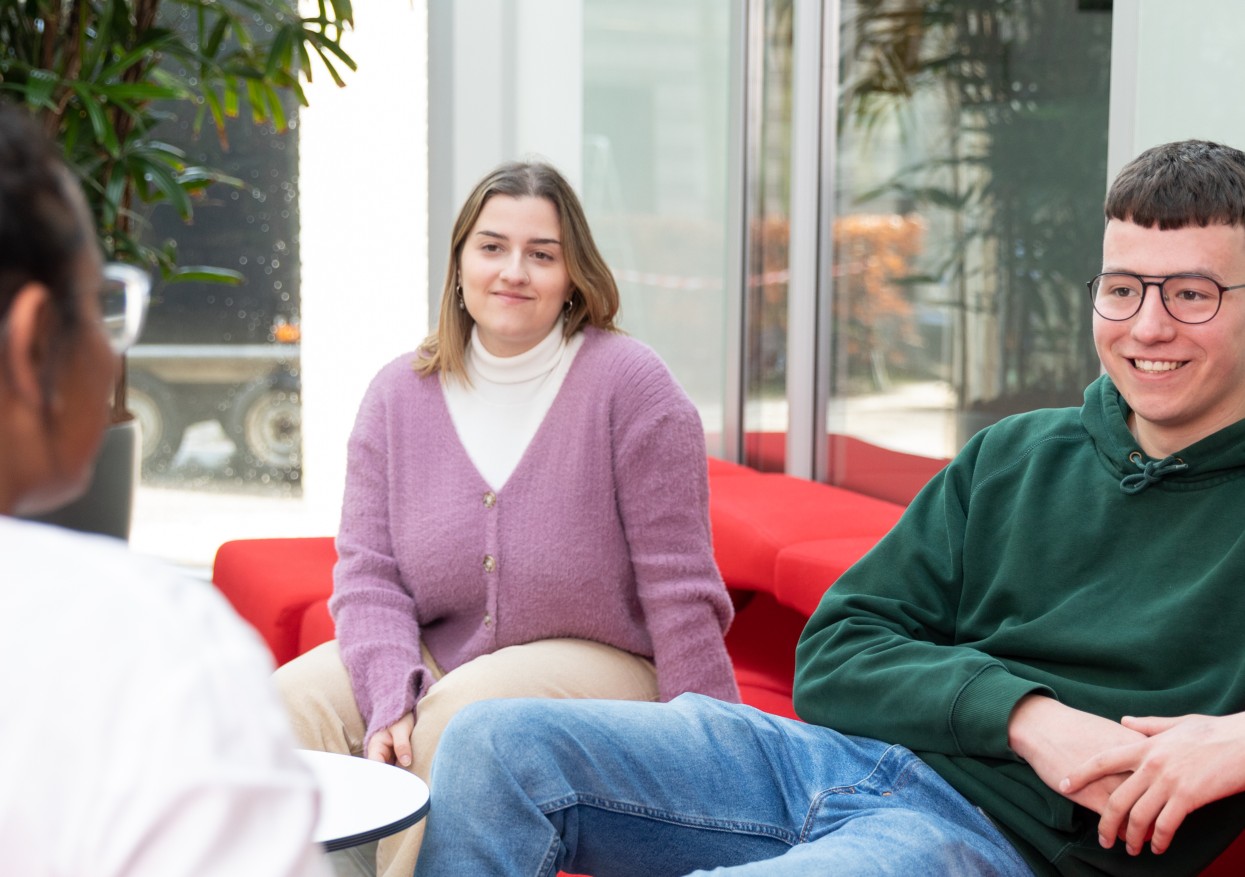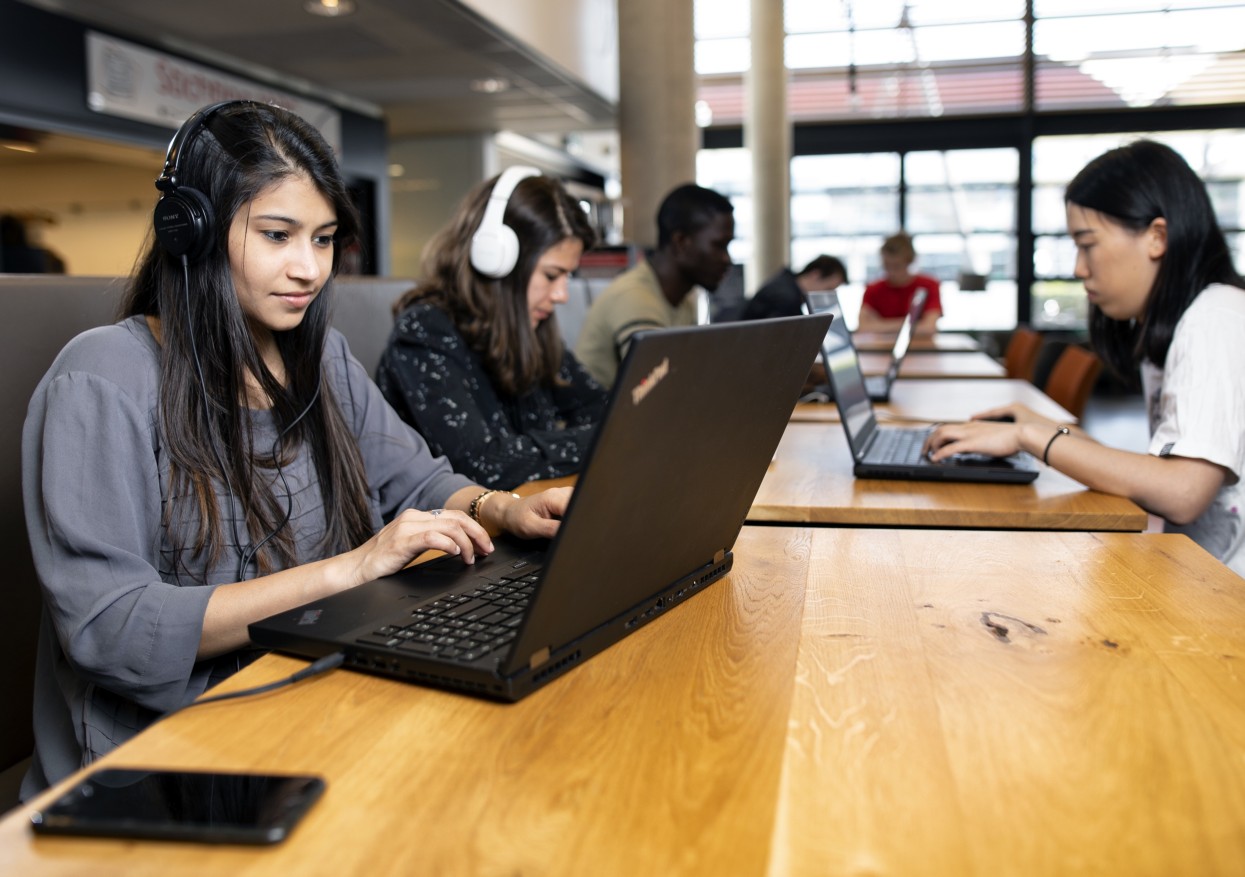
Master of Science
Psychology
Introduction Master's in Psychology
What does it take for people to trust new technologies? How can you promote healthy lifestyles, and take care of mental health and well-being, in times of rising anxiety, depression and burnout rates? What causes (and prevents) criminal behaviour and what’s the best way to negotiate conflicts? And how do people process information and can you support their learning processes? These are just a few of the many, versatile questions you might deal with during the Master’s in Psychology at the University of Twente.
FOCUS AND DISCIPLINES
In this Master’s programme you will gain insights into various fields of psychology in order to design effective interventions to influence human behaviour. You will be ready to tackle complex present-day and future problems, by combining theoretical knowledge with a hands-on approach. Moreover, as a psychologist prepared for the future, you will learn all about psychology being placed in a technological context. You will build your expertise within one of the five specialisations.
Study psychology in the context of technological change
Psychology plays a role wherever people are in contact with other people or organisations or when they interact with technology. Behaviour (doing), emotions (feeling) and cognitions (thinking) are the core domains of psychology. Present-day technologies give rise to new questions within these core domains. How could technology affect us positively in sustainable behaviours? How can apps help prevent obesity, or assist children with learning difficulties? How can Virtual Reality help patients to overcome their phobia? And how do we understand human errors in the age of artificial intelligence? It is increasingly important to learn how to use and integrate technological tools in the work field as a psychologist of the future. Therefore this Master’s prepares you for a future proof career as a psychologist by placing psychology in the contemporary world of technological change. Think about how technology can be understood as a means to measure behaviour and to create behavioural interventions, but also how psychology can be used to improve (new) technologies and how technology can be studied as a context that influences human behaviour.
CAREER PERSPECTIVES
Graduating the Master’s in Psychology at the University of Twente gives you great job opportunities in many different fields. Students usually find jobs shortly after graduation, most of them within three months!
What your future job looks like, highly depends on the specialisation you will choose. One equips you for the post-master to become a licensed psychologist. The others prepare you for the role as researcher, policy maker, advisor or teacher. You can fulfil such positions in all kinds of sectors, including the industry, public health, healthcare or government. You can fulfil such positions in all kinds of other sectors, including the government, public health and healthcare or education, but also within the industry. We even have graduates working as teachers within higher education or as usability specialists at all kinds of (high tech) companies. Your career opportunities are very broad!

How to compose your master's?
Before starting your Master's in Psychology, you will choose one of the five specialisations. This way you can delve into your personal interests and build your own expertise.
Study programme
First, you will choose your specialisation. You will develop knowledge and skills in your chosen field by taking the compulsory specialised set of courses each specialisation has to offer. One extra elective course will give you the opportunity to broaden your horizon (except for the specialisation in Psychology Clinical Psychology and Technology).
Next to taking courses, gaining practical experience in the actual work field of your specialisation by doing an internship is also part of your programme. You will conclude your programme by determining the topic of your Master's thesis. During your Master’s in Psychology, you will collect a total of 60 EC within one year. More information about the specialisations can be found on the next pages.
How to compose your master's in Psychology? What your curriculum looks like, depends on the choices you make when personalising your programme. There are two steps in doing so.
STEP 1: CHOOSE A specialisation
Before starting the programme, you need to choose a specialisation. The Master’s in Psychology has five specialisations:
Conflict, Risk & Safety
Why do people commit crimes or engage in risky behaviour? And how can you resolve conflicts? This specialisation helps you to understand and overcome threats to citizens’ safety.
ut.onl/MPS-crsEducational Psychology
How do people learn? In this specialisation, you will dive into how our brains process information and why everyone learns in their own way, so you can create education that truly suits everyone.
ut.onl/MPS-epHealth Psychology & Technology
How can you help people live healthier and cope with (long-term) illness – with the help of technology? In this specialisation, you’ll explore the connection between health, behaviour, and innovation.
ut.onl/MPS-hptHuman Factors & Engineering Psychology
New technologies can be perfectly designed, but if people can’t use them, they’re useless. In this specialisation, you’ll learn to adapt products and systems to human behaviour.
ut.onl/MPS-hfepPositive Clinical Psychology & Technology
Want to become a psychologist in mental healthcare? This specialisation teaches you how to enhance mental health and well-being in a digital world – using the latest technological innovations.
ut.onl/MPS-pcptSTEP 2: DESIGN THE REST OF YOUR CURRICULUM
Once you have chosen your specialisation, it is time to think about what the rest of your study programme should look like. For you to build your expertise, each specialisation offers a set of its own compulsory courses. Next to this, you will choose one extra elective course (except for the specialisation PCPT) and decide on the topic of your master's thesis. Moreover, an internship is part of the programme, which will give you the possibility to gain practical experience in your specialisation.
Specialisation Conflict Risk & Safety (CRS)
Learn to understand threats to citizens’ physical, psychological, and social safety in order to develop interventions to counter these.
The specialisation in Conflict, Risk, & Safety will provide you with a deeper understanding of the (socio)psychological dynamics of safety issues in the broadest sense of the word, from a physical to psychological to social perspective. You will learn all about how to use psychology to communicate with the public about individual and societal risks such as climate change and crime, how to reduce conflict within and between groups, and how to understand, investigate and reduce crime.
WHAT WILL YOU LEARN?
As a graduate of this Master's and this specialisation, you have acquired specific, scientific knowledge, skills and values, which you can put to good use in your future job.
After completing this specialisation, you:
- have specialist and in-depth knowledge of and insight into contemporary (psychological) theories in the conflict, risk and safety field;
- can analyse complex psychological problems and relate them to a theoretical framework, in such a way that it results in a workable research question or problem statement;
- are able to apply and integrate (psychological) theory, models and procedures to perform research and design effective interventions in the field of conflict, risk and safety (e.g. to prevent cybercrime victimisation or to resolve civilians’ conflicts);
- have sufficient social and communication skills to be able to pleasantly work together with customers, supervisors, clients and peers in the conflict, risk and safety field;
- have the attitude and skills to be able to critically reflect on and form an opinion on the meaning, value and ethical conduct of scientific knowledge.
EXAMPLE OF COURSES YOU FOLLOW DURING THIS specialisation:
- The course Psychology and Crime will provide you with an in-depth understanding of social psychological theories regarding crime-related aspects, from determinants to interventions and from detection to treatment.
- The course Psychology of Sustainability focuses on the many facets of citizens' perceptions and choices that determine the very success of technological, social, or policy interventions that are brought to bear to help make a transition to a sustainable society.
- During the course Group Dynamics and Interventions, you will experience intra- and intergroup processes yourself (e.g. group formation, power relations, conflicts) and examine their consequences on the well-being of group members, productivity, decision making and creativity.
Job opportunities
Graduating with a specialisation in CRS, you will have in-depth knowledge in i.e. conflict negotiation, legal and forensic psychology, group dynamics and leadership, risk communication, and training and interventions. Thanks to this broad expertise, the types of jobs you could pursue after graduation are highly varied. Graduates found employment within e.g. the forensic or safety domain, the government sector, consultancy, research, education and even in journalism.
Specialisation Educational Psychology (EP)
LEARN TO UNDERSTAND INDIVIDUAL LEARNING PROCESSES IN ORDER TO DESIGN ADAPTIVE (TECHNOLOGY-ENHANCED) LEARNING TOOLS AND MATERIALS.
Within the specialisation in Educational Psychology, you will study learning from an in-depth psychological perspective. The key is to understand the (mental) learning processes and (differences in) individual learning needs in order to make education more adaptive. With your expertise, you can provide teachers, educational institutes and companies with tools and teaching materials that can address the individual learning needs of students and workers, whether it is a six-year-old pupil, a twenty-year-old university student or an employee of a big company.
WHAT WILL YOU LEARN?
As a graduate of this Master's and this specialisation, you have acquired specific, scientific knowledge, skills and values, which you can put to good use in your future job.
After completing this specialisation, you:
- have a thorough understanding of psychological theories of learning and the role of technological innovations in learning;
- can (re)design instructional materials for various objectives, diverse audiences, and different contexts;
- are able to investigate the quality of existing learning materials and formulate relevant guidelines for optimisation and implementation of these materials;
- have developed a substantiated, context-dependent approach for designing learning materials;
- value differences in learner characteristics and consider this in developing and investigating learning contexts and materials;
EXAMPLE OF COURSES YOU FOLLOW DURING THIS SPECIALISATION:
- During the course Learning and Instruction you will find out what requirements instructional materials must meet to be effective, and what in-depth psychological theories tell us about how people learn and process information.
- The course Adaptivity in Learning and Instruction will provide you with useful insights for differentiating educational practices. You will explore how different learner characteristics can shape the design of adaptive (technology-enhanced) learning environments.
- Student well-being is highly important when it comes to achieving learning goals. The course Positive Education takes a positive approach, focusing on factors such as engagement, relationships, meaning, and accomplishment within education.
JOB OPPORTUNITIES
After completing the Master’s in Psychology with a specialisation in Educational Psychology, you can look forward to a variety of job prospects. You might become an educational consultant, instructional designer, or researcher, to name a few of your options. The great advantage of having a Master’s degree in Psychology with a specialisation in Educational Psychology is your in-depth understanding of psychological processes and knowledge of specific target groups and specific contexts, which will make you stand out in the job market compared to other educational scientists.
Specialisation Health Psychology & Technology (HPT)
STUDY THE RELATIONSHIP BETWEEN HEALTH, BODY, MIND AND BEHAVIOUR IN ORDER TO PROMOTE HEALTHIER LIFESTYLES AND SUPPORT PEOPLE COPING WITH DISEASES.
In the specialisation in Health Psychology & Technology, you will use an in-depth understanding of (social) psychology and explore the opportunities provided by technological innovations to promote (mental) health, healthy lifestyles or to help people cope with diseases.
WHAT WILL YOU LEARN?
As a graduate of this Master's and this specialisation, you have acquired specific, scientific knowledge, skills and values, which you can put to good use in your future job.
After completing this specialisation, you:
- have solid knowledge and understanding of contemporary theories about determinants of health, behaviour change techniques and about how illness may affect psychological, social and spiritual well-being;
- can evaluate existing interventions and conduct scientifically sound studies to understand or to test assumptions about health, behaviour and well-being;
- can design and realise health-promoting interventions, based on theoretical insights, empirical evidence and users’ wishes;
- are able to work in an interdisciplinary context, communicate with different stakeholders, take a leadership role and reflect on your own professional development;
- have developed your own unique identity as a Health Psychologist.
EXAMPLE OF COURSES YOU FOLLOW DURING THIS specialisation:
- How can you tackle health issues such as obesity, addictions, sexually transmitted diseases, or smoking? During the course Health Promotion, you will plan and design an academically substantiated (eHealth) intervention for a specific target group in our society, aiming to stimulate healthy behaviour.
- The course Coping with Disease in a Digital Era teaches you about the psychological processes involved in experiencing and adapting to (chronic) illnesses and disease-related behaviours, such as help-seeking or self-management. You will research what it takes to cope with diseases in every phase of the ‘patient journey’, from the first diagnosis to palliative care.
- The course Compassionate Health Technology covers evaluating healthcare technologies for empathy and utility, conducting heuristic evaluations, and training in compassionate online counseling. You will also assess the role of AI in supporting compassionate care.
JOB OPPORTUNITIES
As a graduate of this specialisation, numerous options are open to you. As the importance of public health initiatives continues to grow, your ability to link psychology, technology and health is invaluable. You can play a coordinating and initiating role in purchasing, (re)designing, implementing, and evaluating health-promoting interventions for the public, patients and caregivers.
Specialisation Human Factors & Engineering Psychology (HFE)
USE YOUR UNDERSTANDING OF HUMAN COGNITION AND BEHAVIOUR TO DESIGN, IMPROVE AND ADAPT PRODUCTS, PROCESSES, AND SYSTEMS IN TERMS OF EFFICIENCY, USABILITY, OR SAFETY.
The specialisation in Human Factors & Engineering Psychology will provide you with an in-depth understanding of human cognition and behaviour, in order to design, improve and adapt products, processes and systems to complement human behaviour and capabilities.
WHAT WILL YOU LEARN?
As a graduate of this Master's and this specialisation, you have acquired specific, scientific knowledge, skills and values, which you can put to good use in your future job.
After completing this specialisation, you:
- have solid knowledge in Human Factors and Engineering methods that are available for design, usability and user experience research;
- have a broad overview of cognitive, physiological and environmental aspects involved in Human Factors and Engineering;
- are able to apply cognitive theories and principles to the design of socio-technical systems, products and services;
- can apply advanced methodologies relevant to research problems in the field of Human Factors and Engineering;
- have a critical mindset towards the integration of technology in society to identify gaps and propose solutions.
EXAMPLE OF COURSES YOU FOLLOW DURING THIS SPECIALISATION:
- How can you design interactive products that suit the human user’s mind in the best way? The course User Psychology will familiarise you with the field of usability research and user experience (UX) design.
- During the course Advanced Research Methods for Human Factors and Engineering, you will be introduced to research methods and tools that can help to evaluate and design systems, from eye-tracking methods to EEG measurements, and from statistics to coding in R. In addition, you will learn to critically reflect on research in this applied field.
- How to use our knowledge of cognitive processes when designing and using (medical) devices? The course Human Factors in Healthcare will give you in-depth insights into human cognition and usability in the specific field of healthcare.
JOB OPPORTUNITIES
By completing the Master’s in Psychology with this specialisation, you will be an expert in recognising and understanding human cognitive processes, using this knowledge in optimising a product or process, and, in that way, enhancing User Experience (UX). With this expertise, you will be in high demand in a wide variety of sectors. You might find yourself working within a software company, the automotive or aviation industry, the medical industry, consumer goods, the government sector or even the gaming industry, to name some of your many options.
Specialisation Positive Clinical Psychology & Technology (PCPT)
PROMOTE AND PROTECT THE MENTAL HEALTH AND WELL-BEING OF PEOPLE IN TODAY’S MODERN WORLD, USING STATE-OF-THE-ART TREATMENTS AND TECHNOLOGIES.
Historically, the field of clinical psychology is concerned with the assessment and treatment of psychological disorders and behavioural problems. But mental health and well-being go far beyond symptom reduction. What does it take to improve positive mental health? Especially in today’s modern world, with social media impact and rising rates of stress, anxiety, and depression? You will discover this and more in the specialisation in Positive Clinical Psychology & Technology.
WHAT WILL YOU LEARN?
As a graduate of this Master's and this specialisation, you have acquired specific, scientific knowledge, skills and values, which you can put to good use in your future job.
After completing this specialisation, you:
- have in-depth knowledge of positive-psychological and psychopathology-oriented theories;
- know the principles of cognitive behavioural therapy and related treatments and techniques from a positive psychology framework;
- can reflect critically on the opportunities and limitations of new technologies for mental healthcare to decrease suffering and/or increase wellbeing;
- have online and offline counselling skills, covering positive-psychological and psychopathology-oriented treatment and diagnostic skills;
- are a (self-)compassionate and reflective professional.
EXAMPLE OF COURSES YOU FOLLOW DURING THIS SPECIALISATION:
- During the course Positive Clinical Psychology, you will deepen your understanding of positive psychological theories that explain psychopathology and well-being and apply these theories in clinical settings.
- Therapy through technology is often framed as cold and uncaring, contrasted with the warmth and connection from a human therapist. But is that really true? In the course Compassionate Technology you will explore how both technology and the human therapist can create compassionate mental healthcare together.
- In order to understand other people and what inspires them, it is important to know yourself, too. In the course Personal Reflection & Development, you will enhance your vision, self-knowledge and professional identity in order to start open dialogues with others.
JOB OPPORTUNITIES
As a graduate of this specialisation, you will have a wide range of career opportunities. The majority of our graduates continue with a postmaster’s programme - which the UT offers inhouse as well - in order to become a licensed therapist or diagnostician. In that case, you could become a psychologist in a variety of settings, e.g. mental healthcare, a hospital, a forensic institute, a nursing home, a rehabilitation centre, or youth care, to name some examples. You could also commit to becoming a coach, focusing more on positive psychology instead of clinical psychology.
Juliane's Experience
"IT FEELS GOOD TO CONTRIBUTE TO RESEARCH THAT'S AIMED AT IMPROVING THE SITUATION OF PEOPLE WITH A CHRONIC ILLNESS OR DISABILITY."
Choosing a Specialisation
During my Bachelor’s in Psychology at the University of Twente, I realised that health is something that fascinates me a lot. Why do some people make healthier choices than others? What do people with chronic illnesses encounter and how can they best be supported in managing their symptoms and illness? And why do some people manage disease better than others? That’s why I chose the specialisation in Health Psychology & Technology within the Master’s in Psychology.
Importance of e-Health
I find the link with technology and the focus on e-Health particularly interesting within this specialisation because this is becoming increasingly important within healthcare and psychology. I decided to further focus on this by following up my Master’s with a PhD, in which I investigated the effects of a blended-care treatment for people with chronic fatigue and type 1 diabetes. This blended treatment is carried out partly via the internet and partly via face-to-face contact. The treatment turned out to be effective and is now offered in regular care!
It is very nice to see that your research findings do not just end up on a shelf, but are actually used in practice. I realised that I wanted to keep doing research with social relevancy and this is still very much the case in my current job. As a project leader, I am coordinating a large-scale and long-term research project into the experiences with care and participation of people with a chronic illness or disability in the Netherlands.
Shaping policy with research findings
In my current job as a researcher at Nivel, a research organisation focusing on healthcare, there is a lot of collaboration with policy institutions and civil society organisations. This means that many of the research findings are applied in practice. For example, I recently collaborated on the study 'Unlimited Participation', in which we looked at the participation of people with disabilities in society. Our findings have been presented and discussed in the Lower House of Parliament and are used to shape policy for this group. Drawing up project ideas and research questions, analysing quantitative and qualitative data and presenting the findings to various stakeholders: I am still making use of many research skills I gained during my Master’s.
Altogether, I can highly recommend this Master's in Psychology. It is a perfect start for your career!

Admission and Application Student information
There are a couple of things you should know before you apply to the Master in Psychology. The route to apply to the Master's in Psychology depends on the specialisation you choose and also depends on your nationality and educational background.
Admission for crs-hfe-hpt-EP
University of Applied Sciences (hbo)
As a bachelor's student from a University of Applied Sciences (hbo), you need to complete a pre-master's programme first. You can only enter the Master's in Psychology after you have met the requirements of the Pre-Master. The purpose of the Pre-Master is to bring your knowledge up to the required level.
UT or other Dutch Research Universities
If you have a Bachelor’s degree in Psychology then you can apply for all specialisations in the Master’s in Psychology.
The exact details of your previous education will determine whether you can transfer directly into the Master’s. Perhaps you need to take the Pre-Master's first to prepare yourself for the Master's in Psychology.
International students
Are you an international student and would you like to pursue a master's programme at the UT? Find out if you are admissible first! In order to do so, fill in the mandatory online eligibility check (e-check), before applying.
Admission for pcpt
The admission requirements for the specialisation in Positive Clinical Psychology & Technology (PCPT) are a little bit different, for starters: a selection procedure is part of the admission process, with a maximum number of places available.
University of Applied Sciences (hbo)
As a bachelor's student from a university of applied sciences (hbo), you need to pursue a pre-master's first. The purpose of the Pre-Master's is to bring your knowledge up to the required level. The Pre-Master’s for the Master's specialisation PCPT is only open to students with a degree in:
Applied Psychology (Toegepaste Psychologie, 240 EC full-time programme only), including the clinical track (specialisatie Gezondheidspsychologie, voorheen Klinische Hoofdstroom) of Saxion University of Applied Sciences in Deventer, the Netherlands.
UT or other Dutch Research Universities
The selection procedure is simple and transparent and aims to admit students who consciously choose the field of work of a health care psychologist and for whom the PCPT specialisation is a suitable programme. If you meet the formal admission requirements for the Master's Psychology, specialisation PCPT, you will be invited for the selection procedure. Find out more about the selection procedure on the admission website for the specialisation PCPT.
International students
The details of your previous (bachelor’s) education will determine whether you fulfil the admission requirements for the Master's in Psychology, specialization PCPT. In general, at least a Bachelor’s degree in the academic field of Psychology is needed, including specific knowledge, such as clinical and personality psychology, psychopathology, neuropsychology, developmental psychology, conversation/communication skills and Psychodiagnostics (including the entire diagnostic assessment process documented in a (psychological) case report).
Furthermore, your (English) language skills and academic/research skills will be assessed in the application process.
DO THE ONLINE ELIGIBILITY CHECK
Find out if you are admissible to this Master's within five minutes with our eligibility check! This e-check is created for upcoming master's students with an international bachelor's degree to verify that they meet the specific admission requirements for this Master's. For students with an international degree, it is mandatory to complete the e-check. Start the check, it takes about five minutes to complete it.
Deadlines
You can start in September and February. Psychology has a deviating application deadline for Dutch students. For the PCPT specialisation, there are additional deviating deadlines. Please check the admission pages for more information:
Why choose to study at UT?
As a UT student, you will learn how to use innovative technologies to influence today's societal challenges meaningfully. You will benefit from excellent, highly personalised education and research in fields ranging from social sciences and engineering to natural sciences and life sciences. You will learn to work with experts from other disciplines and cultures. In doing so, you will develop in-depth professional knowledge and intensive personal growth.
Your study location is our campus: a dynamic community for young people to work, live and socialise. It's a breeding ground for brilliant ideas, where you follow academic education and apply your new skills in the various state-of-the-art labs. This is also where you meet up with friends, play sports or visit the theatre. You can even go for groceries or catch up in the bar. And downtown Enschede is just a 10-minute bike ride away!






